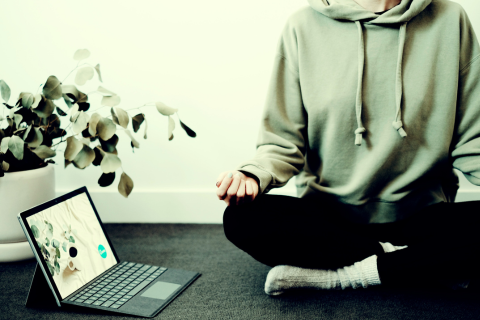 In my over thirty years of experience as a psychologist, I’ve come to deeply understand just how tough life can be. That’s why I’m a huge proponent of research-backed tools that can help us cope with the challenges in our lives. There are SO many things out there now to help us with our health and wellness! There are mindfulness apps like Calm and Headspace, and gratitude apps that help structure regular journaling. Often, these tools come with studies that demonstrate how and how well they might work. This week, I thought I’d write about the science of ‘Headspace’.
In my over thirty years of experience as a psychologist, I’ve come to deeply understand just how tough life can be. That’s why I’m a huge proponent of research-backed tools that can help us cope with the challenges in our lives. There are SO many things out there now to help us with our health and wellness! There are mindfulness apps like Calm and Headspace, and gratitude apps that help structure regular journaling. Often, these tools come with studies that demonstrate how and how well they might work. This week, I thought I’d write about the science of ‘Headspace’.
Headspace has a wealth of evidence to support its efficacy. One study examined the use of Headspace for managing stress. The randomized control trial allocated participants to two conditions: an ‘audiobook’ condition where participants listened to a neutral audiobook and a ‘Headspace’ condition where participants took part in structured Headspace meditations. Both groups of participants listened to their respective assignments, an audiobook or a Headspace meditation, for 10 days. The researchers measured stress levels in both groups before and after the 10-day intervention. They found that participants who listened to audiobooks for 10 days did not experience a reduction in their stress levels before and after the intervention. Participants who undertook a 10-day Headspace course, however, did report lower stress levels! A 14% reduction in stress, in fact. The same study found a decrease in irritability among those who had used Headspace, as well. Sounds pretty good to me!
 Another study tested the effects of a three-week Headspace course on people’s compassion. The design of this study was a bit more complicated than the stress study. The researchers invited participants into a public waiting area outside a lab. The room had three chairs: two of them occupied by researchers pretending to be participants. The participants seated themselves in the last remaining empty chairs. As they sat waiting, a third ‘fake’ participant entered the room on crutches and using a walking boot. The variable of compassion was measured by whether the participant who’d just taken the last seat got up and gave the third ‘fake’ participant on crutches their chair. There were two groups of participants randomly assigned to one of two intervention groups: a control group who had undertaken a three-week cognitive skills course and the Headspace group who had undertaken a three-week mindfulness course. The results of the study showed that the Headspace group gave up their seats more frequently than the control group. It’s pretty cool to think that just a few weeks following an app could help us all be a bit kinder to each other! There are also studies showing that using the Headspace app improves people’s focus and boost feelings of overall happiness and well-being.
Another study tested the effects of a three-week Headspace course on people’s compassion. The design of this study was a bit more complicated than the stress study. The researchers invited participants into a public waiting area outside a lab. The room had three chairs: two of them occupied by researchers pretending to be participants. The participants seated themselves in the last remaining empty chairs. As they sat waiting, a third ‘fake’ participant entered the room on crutches and using a walking boot. The variable of compassion was measured by whether the participant who’d just taken the last seat got up and gave the third ‘fake’ participant on crutches their chair. There were two groups of participants randomly assigned to one of two intervention groups: a control group who had undertaken a three-week cognitive skills course and the Headspace group who had undertaken a three-week mindfulness course. The results of the study showed that the Headspace group gave up their seats more frequently than the control group. It’s pretty cool to think that just a few weeks following an app could help us all be a bit kinder to each other! There are also studies showing that using the Headspace app improves people’s focus and boost feelings of overall happiness and well-being.
 Overall, there’s a wealth of evidence indicating that meditation and mindfulness, even with a short-term app on your phone, might have positive effects. Of course, mindfulness is not a magic cure for all things nor does every single study find positive effects. (If anyone finds something like that, please tell me about it!) You can build a toolkit of potential strategies, including mindfulness, to test out in your own life. Only you will know what works best for your life and circumstances, and you have plenty of options to choose from!
Overall, there’s a wealth of evidence indicating that meditation and mindfulness, even with a short-term app on your phone, might have positive effects. Of course, mindfulness is not a magic cure for all things nor does every single study find positive effects. (If anyone finds something like that, please tell me about it!) You can build a toolkit of potential strategies, including mindfulness, to test out in your own life. Only you will know what works best for your life and circumstances, and you have plenty of options to choose from!
Citations:
Bennike, I., Wieghorst, A., & Kirk, U. (2017). Online-based mindfulness training reduces behavioral markers of mind wandering. Journal of Cognitive Enhancement, 1(2), 172-181. doi: 10.1007/s41465-017-0020-9
Economides, M., Martman, J., Bell, M.J., & Sanderson, B. (2018). Improvements in stress, affect, and irritability following brief use of a mindfulness-based smartphone app: a randomized controlled trial. Mindfulness, 9(5), 1584-1593. doi:10.1007/s12671-018-0905-4
Howells, A., Ivtzan, I., & Eiroa-Orosa, F.J. (2016). Putting the ‘app’ in happiness: a randomised controlled trial of a smartphone-based mindfulness intervention to enhance wellbeing. Journal of Happiness Studies, 17(1), 163-185. doi: 10.1007/s10902-014-9589-1
Lim D., Condon P., & DeSteno D. (2015). Mindfulness and compassion: An examination of mechanism and scalability. PLoS ONE 10(2): e0118221. doi: 10.1371/journal.pone.0118221
Montero-Marin, J. et al., (2022). School-based mindfulness training in early adolescence: What works, for whom and how in the MYRIAD trial? Evidence-Based Mental Health. doi: 10.1136/ebmental-2022-300439
